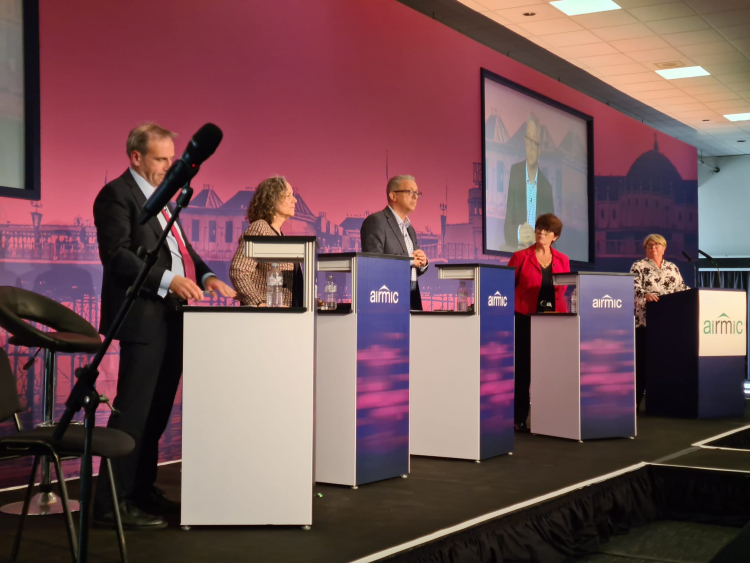Insurance leaders debate megatrends and face buyer challenges

Day two of the Airmic Annual Conference featured a debate of senior insurance leaders from the ABI, Aon, FM Global and Swiss Re.
Mega trends for global risk transfer were on the menu for a keynote debate of insurance leaders on the second day of the Airmic Annual Conference in Brighton.
Pandemic, systemic cyber risks, society’s ageing demographic, and the existential threat of climate change were together described as the “Four Horsemen of the Apocalypse” by Julie Page, CEO of Aon UK.
These four mega-trend risks are interconnected and therefore correlated from an insurance perspective, she explained, amid a raft of other closely linked geopolitical tensions, and a broader rise of intangible assets on institutions’ balance sheets.
“The protection gap is growing and these mega-trends are increasingly interwoven,” Page warned.
The threats are too big for insurance alone, she suggested. For example, the economic bill from the pandemic was already more than £400 billion, according to the UK Government.
The economic loss potential from a systemic cyber disaster “is beyond our ability to compute”, she acknowledged, and “too big for insurance to digest in its entirety”.
Climate crisis
Climate change will upend supply chains globally, warned Melanie Slack, Head of UK, Ireland, SA and EMEA wholesale at Swiss Re Corporate Solutions.
“As a planet we’re in a race to net zero and the insurance industry has a key role to play in the net zero target gaining traction, globally” she said.
Page acknowledged that even if a greater share of climate risk exposed assets were insured, the effects of climate change are still for the most part uninsurable, and will therefore be borne by society without risk transfer, while noting the sector must deploy its expertise in modelling extreme weather towards building societal resilience to climate change.
Stranded assets are assets that have suffered from unanticipated or premature write-downs, devaluations, or conversion to liabilities. Increasingly risk factors related to the environment are stranding assets and this trend is accelerating.
Managing risks of stranded assets and increasing asset allocations to green investments, particularly within pension funds, were a focus of comments by Huw Evans, managing director of the Association of British Insurers.
Question time
Questions, quickly turned to more acute matters of pricing and hard market conditions from the audience. Panellists use of the term “partnership” between the insurance industry and risk professionals was met with some scepticism from the audience.
Evident frustration was voiced in a question about hard market conditions, noting that the sudden premium rate rises and withdrawn capacity seen at recent withdrawals did not emphasise a relationship based on partnership.
Responding, Aon UK’s Page assured: “We are in this together. I can understand your frustration with the market.”
The panel acknowledged that the insurance market should look longer term, and challenge the cyclical nature of typical renewal processes.
Panellists suggested one way in future to lessen the effects of a market turn on pricing would be to share more data between insureds and insurers – particularly for risks such as cyber.
To achieve the UK Government’s goal of making the UK one of the most secure places in the world to do business there must be a strengthening the UK’s cyber ecosystem and more collaboration between government, insurers and businesses. This could help provide a vehicle for data sharing for cyber, panellists suggested.
Existing public-private insurance partnerships – such as the Pool Re backstop for reinsuring mainland UK terrorism risk – have focused on transferring financial risk, but risks such as cyber could see greater value in government-led data sharing initiatives, panellists agreed.
“Don’t allow your organisations to become hostage to fortune,” said Andrew Bryson, managing director, FM Global.
“More data than ever are available for risk managers and the insurance community. This is vital for understanding and combating climate change, for example. It represents a huge opportunity for a risk manager with the data and tools to support the C-Suite conversation,” he added.
Evans at the ABI concluded the debate with a note of humility from the insurance industry. “This is not about saints and sinners between insurers, risk managers and brokers. It’s important that we learn lessons and show more humility,” he said.
